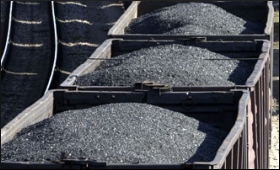|
|
|

|
Coal India approves supply penalty clause
|
|

|
|
| Top Stories |
 |
|
|
|
SME Times News Bureau | 08 Aug, 2012
In a decision crucial to India's power generation capacity, Coal India Tuesday agreed to a revised penalty regime in case of shortfall in supplies to power producers under the fuel supply agreement (FSA).
"The Coal India board has approved a changed penalty regime whereby a penalty of 1.5 percent would be applicable for a supply range of 65 percent to 80 percent," Coal India Chairman S. Narsingh Rao told IANS.
Under the newly approved regime, supplies ranging from 60-65 percent would attract 5 percent penalty, while 55-60 percent supplies would have a 10 percent penalty and 50-55 percent supplies would attract a 20 percent penalty.
If the company fails to supply at least 50 percent of the coal amount agreed, it would be liable for a penalty of 40 percent.
The penalty issue has been contentious as power firms had been opposing the "meagre" penalty clause of 0.01 percent applicable after 3 years of shortfall in the earlier agreement. They had refused to sign the FSA
The government had asked Coal India Ltd (CIL) in April to commit a minimum of 80 percent supply to power producers failing which it would attract penalty.
"Coal India board also agreed on importing coal to meet consumer demand, and on price pooling on this account," Rao said.
Price pooling denotes fixing a price for coal supplied as an average of the prices of both imported and domestically produced coal. Imported coal is of better quality with a higher calory value.
"We have no objection to pooling of prices if it is acceptable to all stakeholders," Rao said
.
"We are selling coal at a discount of 26 to 70 per cent of the imported price in energy terms. It is not feasible to have 100 per cent import parity in the coal price."
With coal pool pricing and import of coal, Coal India will be able to support 80 per cent coal supply to a power production capacity of about 100,000 megawatt, which is half of country's total capacity.
Short supply of coal has affected thermal power generation in the country and Tuesday's decision will facilitate signing of new FSAs with the power producers.
According to the Coal India chairman the company aims to increase coal production by 29 million tonnes in the current year to reach a total output of 464 million tonnes.
With pool pricing, power plants will pay a higher price for coal by Coal India. As per Central Electricity Authority estimates, coal price will go up by at least Rs 105 per tonne.
|
|
|
| |
|
|
|
|
|
|
|
|
|
|
|
|
|
|
| |
| Customs Exchange Rates |
| Currency |
Import |
Export |
US Dollar
|
₹91.35
|
89.65 |
UK Pound
|
₹125.3
|
₹121.3 |
Euro
|
₹108.5
|
₹104.85 |
| Japanese
Yen |
₹58.65 |
₹56.8 |
| As on 19 Feb, 2026 |
|
|
| Daily Poll |
 |
 |
| What is your primary "Make or Break" expectation from the Finance Minister this year? |
|
|
|
|
|
| Commented Stories |
 |
|
|
|
|
|
| |
|